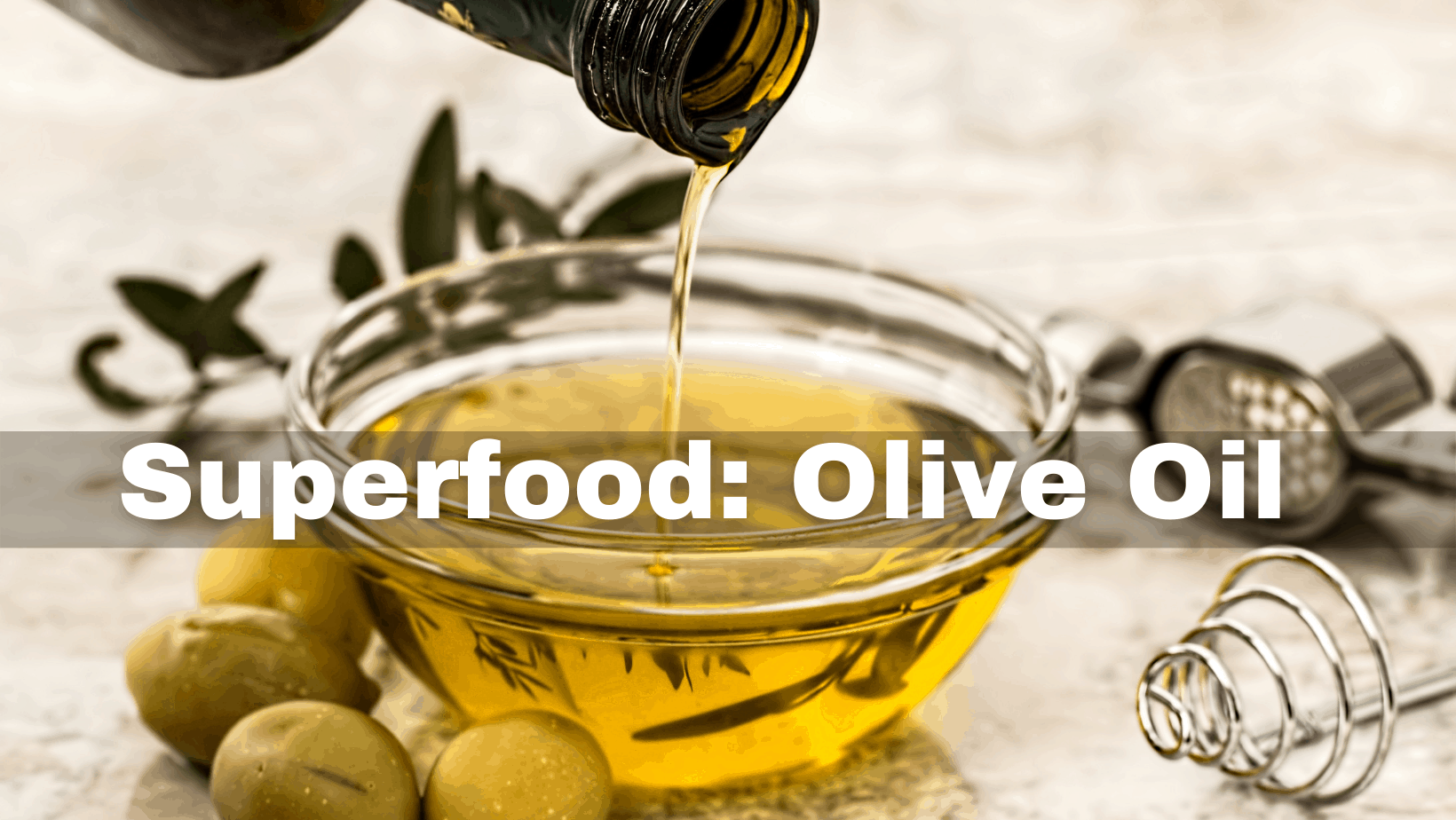A recent discussion with a patient had us talking about the health benefits of olive oil. Olive oil drizzled over a salad not only makes you feel full faster, it is a great source of energy, and has many added health benefits too. In this month’s newsletter, we will explore the health benefits of olive oil, and why you may want to incorporate it into your daily diet.
Olive oil is considered to be the healthiest fat in the world. Olive oil is derived from olive trees that are found along the Mediterrean Basin, and has been cultivated for thousands of years.
So what makes olive oil a superfood? It has to do with its fat composition. For reference, here is the composition of one table-spoon (13.5g) of extra-virgin olive oil:.
Monounsaturated Fat: 73% (mostly oleic acid)
Oleic acid is a type of fatty acid. Oils with oleic acid are used to replace saturated fats in the diet. Oleic acid might improve heart conditions by lowering cholesterol and reducing inflammation.
Saturated Fat: 14%
Saturated fat is a type of dietary fat. It is one of the unhealthy fats, along with trans fat. These fats are most often solid at room temperature. Foods like butter, palm and coconut oils, cheese, and red meat have high amounts of saturated fat. Too much saturated fat in your diet can lead to heart disease and other health problems
Vitamin D: 13% of Daily Value
Vitamin helps promote healthy bones and teeth, supporting the immune system, regulating insulin levels and improving lung function.
Vitamin K: 7% of Daily Value
Vitamin K helps to make various proteins that are needed for blood clotting and the building of bones. Prothrombin is a vitamin K-dependent protein directly involved with blood clotting. Osteocalcin is another protein that requires vitamin K to produce healthy bone tissue.
Antioxidants Such As Oleocanthal and Oleuropein
These chemical may help to prevent cancer, improve cognition, reduce the chance of Alzheimers and help lower cholesterol
Drizzle it over salad or mix it into salad dressing.
Use in marinades or sauces for meat, fish, poultry, and vegetables. Oil penetrates nicely into the first few layers of the food being marinated.
Add at the end of cooking for a burst of flavor.
Drizzle over cooked pasta or vegetables.
Use instead of butter or margarine as a healthy dip for bread. Pour a little olive oil into a small side dish and add a few splashes of balsamic vinegar, which will pool in the middle and look very attractive.
For an easy appetizer, toast baguette slices under the broiler, rub them lightly with a cut clove of garlic, and add a little drizzle of olive oil.
Replace butter with olive oil in mashed potatoes or on baked potatoes. For the ultimate mashed potatoes, whip together cooked potatoes, roasted garlic, and olive oil; season to taste.
Make a tasty, heart-healthy dip by mixing cooked white beans, garlic, and olive oil in a food processor; season to taste with your favorite herbs.
Use olive oil in your sauces — whisking will help emulsify, or blend, the watery ingredients with the oil in the sauce.
Extra-Virgin Type of Olive Oil The extra-virgin olive oil type is certainly the best type among all. It is extracted by cold-pressing method to prevent the natural content from being altered by exposures to high temperature. This oil even has lower acidity content compared to its standard virgin counterpart. It is considered the best simply because it retains most of the natural flavor and aroma. This is as well the most commonly used type of olive oil for health purposes.
Virgin-Olive Oil The virgin type of olive oil is an unrefined form. It is extracted by cold-pressing method, and it brings more natural aroma and flavors compared to the aforementioned types above. It contains slightly high acidity content between 1 to 4 percent. This specific type of olive oil is temperature resistant as well. Compared to the extra virgin type, this one has milder taste. This is suitable for low-heat cooking purposes.
Refined Olive Oil This type of olive oil is extracted from black and ripe olive fruits. Among other types, it has the least amount of virgin olive oil which is known for its great benefits in preventing colon cancer.
Pure Olive Oil Although the name clearly suggests that it is pure, this type of oil is not at all pure. In fact, it is a blend of extra virgin or virgin type olive oil with a refined form of olive oil. The blending method is often used when the extraction quality is not as good as expected. In order to improve the quality, the refined oil has to be mixed with a better quality one, either extra virgin or virgin type of olive oil. The added oil will give a higher amount of vitamin E and better flavor.
Olive Pomace Oil The pomace type is the lowest quality olive oil. It is extracted from the residue that remains after the fruit is pressed. After the actual fruits are pressed, they leave residue containing oil and water. Once the water and oil are removed, the residue still contains a certain amount of oil and can be extracted. Since it is extracted merely from residue, virgin oil is mixed to help to improve the quality. Due to this problem, it is the least expensive in the market and suitable only for high-heat cooking.
Although extra-virgin and virgin olive oils stand up to heat remarkably well, they do lose flavor as they’re heated, so they are best for uncooked dishes. Use them to harmonize the spices in a dish, to enhance and build flavors, and to add body and depth.
Olive oil also balances the acidity in high-acid foods, such as tomatoes, vinegar, wine, and lemon juice. In general, treat your olive oils as you do your wines, carefully pairing their tastes with the flavors of the other ingredients in the dishes you are creating.
